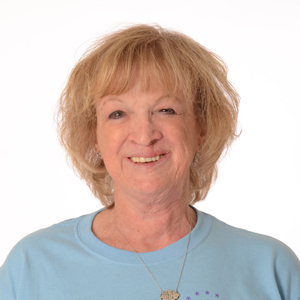
(The following article was written and published by BostonSight. We are re-posting with their permission.)
Suzanne Brown is an incredibly determined woman and a strong voice for people, who, like herself, are affected by EEC (ectrodactyly-ectodermal dysplasia-clefting), a form of ectodermal dysplasias.
Suzanne said, “My commitment is to advocate for the EEC community and to work hand-in-hand with the National Foundation for Ectodermal Dysplasias (nfed.org) to educate others by sharing my story of how my life was transformed by BostonSight® PROSE treatment.”
Ectodermal dysplasias are a diverse group of genetic disorders that involve defects of the hair, nails, teeth, skin, and glands. People are born with the syndrome; some disorders (cleft lip and palate, missing fingers, skin erosion) are apparent at birth. Others (missing hair, abnormally formed nails, skin symptoms, sweat glands that may not work properly and teeth that may be missing/widely spaced) may not become noticeable until the baby grows.
The eyes can also be affected. They may lack tears, have blepharitis (eyelid inflammation), corneal scarring, or be sensitive to light. These associated ocular surface disorders are among the conditions that BostonSight® PROSE successfully treats.
Painful Eyes
Suzanne ignored her painful eyes for years, always thinking, “I’m fine.” But she wasn’t fine. In 2017, she noticed that she was going to bed earlier in the evening because “my eyes were done.” Her only relief was to put ointment in her painful eyes and go to sleep.
Even after learning of PROSE treatment, she said, “I didn’t move forward until I went for a second opinion, and that doctor strongly recommended PROSE.”
Suzanne was extremely nervous, and yet, hopeful that treatment would transform her life. “Before I traveled to BostonSight, I went to the BostonSight website to better understand PROSE and how the staff works with patients to guide them through treatment – every step of the way.”
The PROSE Process
Once patients receive a referral from their primary eye care provider, MD or corneal specialist, PROSE doctors do a medical review based on the information provided. A consultation is scheduled at the Needham clinic where doctors place trial prosthetic devices on the eye(s) to assess potential improvement in vision and symptom relief and whether PROSE is the right choice. Then there is an insurance and financial assistance eligibility review.
Treatment involves PROSE doctors customizing a prosthetic device that is unique to each person’s eye, condition and treatment goals. Patients are also trained on how to apply, remove and care for their devices so they are comfortable and confident.
Suzanne has found tremendous relief and comfort in wearing her PROSE devices. And she has things down to a rhythm that works for her. She said, “If I apply my devices mid-morning, it gives me vision for the rest of my day.”
The improvement to Suzanne’s quality of life has made all the difference in the world. She could not drive without PROSE. An avid hiker, this summer she made the trip of a lifetime with her family to Alaska, where they saw glaciers, went salmon fishing and hiked through Denali National Park. She is even encouraging her 28-year old son, also diagnosed with EEC, to join her as a PROSE wearer.
Suzanne said,
“We were all born this way. And the people at BostonSight just get it. The kindness and understanding with which I was treated – well, the whole process is fantastic. I’m one of your happiest campers!”

Indeed, a very promising treatment, and a very inspirational woman, who, apart from being an advocate for herself and other patients, seemingly had no hesitation or fear to give birth and hope to a child with her condition…..!!:) I do really, ever admire such peopople and stories.
Hi, my son has ectrodactyly ectodermal dysplasia with chronic dry eyes and light sensitivity. Who do you recommend (specialist) he see or contact re: treatment, Prose.
Hi, Kim. Can you please send this request to info@nfed.org? Our staff can provide you with information.